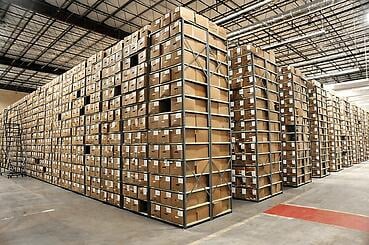
Record storage facilities were the go-to for managing overflowing paper records with limited office space. However, advances in digitization make this method of document storage outdated. Considering the inefficiency of paper record management and filing cabinets, resorting to record storage facilities further complicates an already inconvenient solution. Here we look at the disadvantages of a record storage facility and how digitization makes on-site record storage easy.
The most obvious – and arguably, the most significant disadvantage of a document storage facility is that your physical records are off-site. As a result, should your team require a stored document, there’s no simple solution to retrieve the file. Without 24/7 access to archived files, you create a series of business challenges, including:
- A reduced ability to make critical business decisions quickly due to a lack of data
- Poor customer service when documents related to orders and other relevant information are not accessed instantly
- Reduced productivity related to an inefficient document retrieval process for records offsite
- A faulty paper trail causing issues with audits, lawsuits, compliance issues, and more
An Offsite Document Storage Facility is Expensive
At first glance, you might think your offsite storage unit saves you money by avoiding moving to a larger office. However, your offsite records solution costs you more time and money in the long run. Let’s look at ways it impacts your bottom line:
- You pay an ongoing monthly rental fee for your storage unit
- You lose money in travel time and gas wasted going to and from the storage facility
- You increase labour costs by paying someone to retrieve documents from the site
- You increase labour costs due to the inefficiency of your document retrieval process
- You risk losing customers due to poor service or data breaches
- You put your company at risk for liability when you don’t have a clear and defined paper trail of vital business documents
So, although the monthly costs seem like cost-savings, the expenses associated with offsite records storage are much more expensive.
Risk of Document Damage
Storage facilities undoubtedly have excellent security, perhaps even better than when you store your documents on-site. However, potential damage to physical files is still a threat. Fire, pests, water damage, etc., all present potential risks for your offsite documents. Even if a document isn’t completely damaged, when paper documents aren’t protected, they are susceptible to issues like mold and mildew from moisture or becoming yellowed and brittle in dry environments. As a result, you might discover your documents become dangerous or too delicate to handle. These threats pose a real dilemma if you don’t have a document backup available.
Increased Risk for Data Breaches
We aren’t saying that all storage facilities pose a data breach risk. However, you don’t have control over people accessing your storage unit. This isn’t even necessarily based on day-to-day access by facility employees. For example, say your employee delivers or picks up documents at the storage facility. Those documents have an increased risk of exposure, theft, or loss every time they are retrieved and returned.
Another example is loading or unloading documents at the storage facility. While the delivery person, be they an employee or courier, is busy with their work, it’s easy for someone to grab a file or an entire box and walk away with it. Again, depending on the information stored on the document, this could present a serious breach, especially if documents contain personal information, financial records, or proprietary information about your products.
Misplaced and Misfiled Documents
Manually filing documents increases the risk of misplaced or misfiled documents. There is no way around the manual filing process when you store physical documents offsite. However, it’s not just during the filing process that these documents get lost. For example, if Bob retrieves a file and shares it with Bill, who shares it with Mary, who copies it and leaves a few sheets in the photocopier, suddenly, those touch points expose the document to several potential mishaps.
Whether it’s a single page, or an entire document, handling manual files between your office and an offsite record storage facility leaves too many opportunities for loss. It can be as simple as someone forgetting to return the document to the storage facility. Although having a document sign-out protocol can reduce the risk of lost files, it’s yet another step that complicates the retrieval and return process. In fact, manual records management is a full-time job adding another burden to your strained budget.
Multiple Copies
Another disadvantage is that people might take it into their own hands to create copies to avoid traveling back and forth for files. They might keep a photocopy at their desk, share it with people around the office and the next thing you know; multiple copies of restricted documents are floating around the office. This contributes to data breach risks and leads to potential version disparities.
For example, Bob retrieves the latest schematic for a product from the storage unit. Unfortunately, that schematic is from a file containing historical versions of the product’s updates. If Bob keeps that update at his desk, other people might access the same file during that time and grab an older version. As a result, they have the wrong information, causing misunderstandings and costly errors.
The Advantages of Digitization
Even if you work in an industry that dictates how long you hold onto paper documents, digitization offers the easiest record storage solution with many advantages, including:
- Highly secure storage
- Instant retrieval of records
- Easy indexing for quick cross-referencing for searches
- Affordable Storage
- Freeing up space in your office
- Always having a backup for all documents
- Compliance
- Audit trails
- Accountability for document access
- Preservation of paper documents
- Quick disaster recovery
- Reduced risk for privacy and information breaches
While opting for a record storage facility has some advantages, such as freeing up space at your office, it lacks the advantages of records scanning and electronic document management.
Opting for digital file storage and management resolves common on-site and off-site record storage issues while improving operational efficiency. For more information about digital storage solutions, speak to the team at MES.

